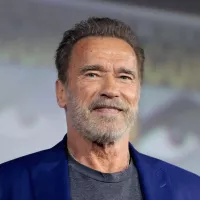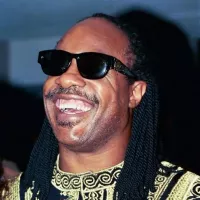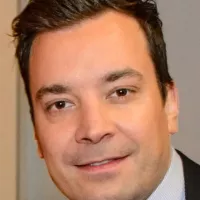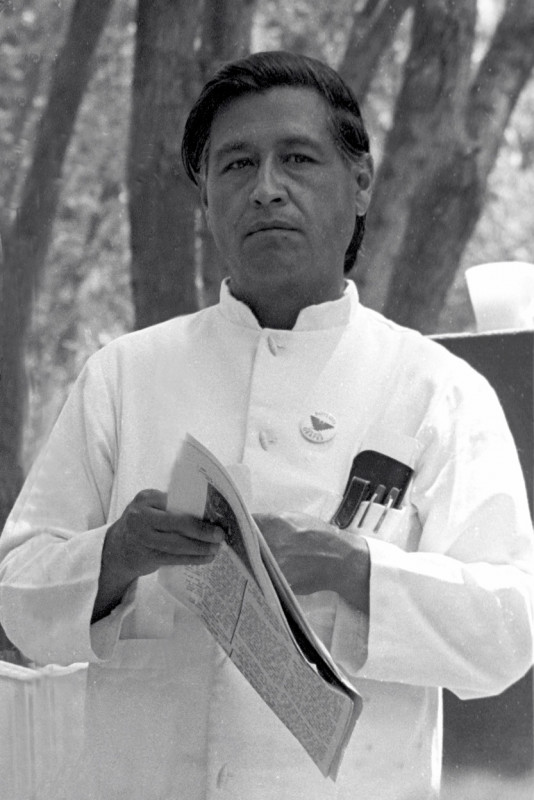A success timeline featuring the most significant achievements of Cesar Chavez.
Cesar Chavez was a prominent American labor leader and civil rights activist. He co-founded the National Farm Workers Association (NFWA) with Dolores Huerta and Gilbert Padilla. NFWA later merged with the Agricultural Workers Organizing Committee (AWOC) to form the United Farm Workers (UFW) labor union. Chavez's ideology blended left-wing politics with Catholic social teachings, advocating for the rights and fair treatment of farmworkers through nonviolent means.
September 30, 1962: Formalization of the National Farm Workers Association
On September 30, 1962, Cesar Chavez formalized the National Farm Workers Association (NFWA) at a convention in Fresno. He was elected as the group's general-director and the members agreed to pay monthly dues of $3.50 once a life insurance policy was established. The group adopted the motto "viva la causa" and a flag with a black eagle on a red and white background.
April 1965: Rose grafters strike
In April 1965, rose grafters approached the NFWA requesting assistance in organizing their strike for better working conditions. The strike targeted Mount Arbor and Conklin companies. Aided by the NFWA, the workers struck on May 3, and the growers agreed to raise wages after four days, leading the strikers to return to work. Cesar Chavez's reputation began to spread through leftist activist circles across California.
December 1965: Support and boycott campaign
In December 1965, Walter Reuther, president of the United Automobile Workers (UAW), joined Cesar Chavez in a pro-strike march through Delano, attracting national media attention. The UAW pledged $5,000 a month to the AWOC and NFWA. Chavez launched a boycott campaign, targeting companies which owned Delano vineyards or sold grapes grown there. The first target was the Schenley liquor company. Pickets were organized in other cities where Schenley's grapes were delivered.
1965: Delano Grape Strike Began
In 1965, Cesar Chavez began organizing strikes among farmworkers, most notably the Delano grape strike.
March 1966: Senate Subcommittee Hearings and March to Sacramento
In March 1966, the U.S. Senate Subcommittee on Migratory Labor held hearings in California, with Senator Robert F. Kennedy attending the Delano hearing. As the strike began to weaken, Cesar Chavez decided on a 300-mile march to Sacramento to attract attention for their cause, starting with about fifty marchers leaving Delano.
July 1969: Negotiations with Grape Growers
In July 1969, Cesar Chavez negotiated contracts with Lionel Steinberg, a grape grower in the Coachella area, allowing Steinberg's products to be sold with a union logo, exempting them from the boycott. Other Coachella growers eventually followed suit.
July 1969: Chavez on the Cover of Time Magazine
In July 1969, Cesar Chavez's portrait appeared on the front of Time magazine, marking him as a national celebrity.
July 29, 1970: Delano Growers Sign Contracts
On July 29, 1970, the Delano growers signed contracts with the union at Forty Acres Hall, agreeing to wage rises for pickers, a health plan, and safety measures regarding pesticide use.
1970: Delano Grape Strike Ended
In 1970, the Delano Grape strike that Cesar Chavez helped organize came to a close.
November 1972: Defeat of Proposition 22
In November 1972, Proposition 22, which would have banned boycott campaigns in California, was defeated by a margin of 58 percent to 42 percent, after a campaign run by LeRoy Chatfield.
1973: Jefferson Award for Greatest Public Service
In 1973, Cesar Chavez received the Jefferson Award for Greatest Public Service Benefiting the Disadvantaged.
November 1974: Election of Jerry Brown
In November 1974, the Democratic Party's candidate, Jerry Brown, was elected governor of California.
February 1975: March to Gallo Headquarters
In February 1975, the UFW organized a four-day march from San Francisco to the Gallo headquarters in Modesto, amassing a crowd of around 10,000 protesters to rekindle the successes of the late 1960s.
June 1975: California Agricultural Labor Relations Act (ALRA) Signed into Law
In June 1975, Governor Brown signed the California Agricultural Labor Relations Act (ALRA) into law, guaranteeing farmworkers the right to a secret ballot and widely seen as a UFW victory.
1975: California Agricultural Labor Relations Act Passed
In 1975, Cesar Chavez's alliance with California Governor Jerry Brown helped ensure the passing of the California Agricultural Labor Relations Act.
July 1976: Chavez Attends Democratic Party's National Congress
In July 1976, Cesar Chavez traveled to New York to attend the Democratic Party's National Congress, where he delivered a speech nominating Brown as the party's presidential candidate. While Brown came in third, Jimmy Carter won the election, initiating an administration favorable to funding UFW projects.
January 1979: UFW Launches Strike Over Wages
In January 1979, to regain the trust of vegetable pickers, Chavez launched his Plan de Flote and a new strike over wages. The UFW made wage demands days after its contracts expired, impacting eleven lettuce growers in the Salinas and Imperial Valleys, causing lettuce prices to soar.
1982: Kris Kristofferson on Chavez
In 1982, American country music singer Kris Kristofferson called Cesar Chavez "the only true hero we have walking on this Earth today," reflecting the hero worship among many of Chavez's supporters.
1983: Most Admired Latino
In 1983, a poll conducted by the Los Angeles Times found that Cesar Chavez was the Latino whom the Latinos of California most admired.
July 1988: Chavez Launches Another Public Fast
In July 1988, as the UFW's boycott of Bruce Church products failed to gain traction, Cesar Chavez launched another public fast at Forty Acres. The fast attracted media attention when three of Robert Kennedy's children visited.
November 1989: Awarded the Order of the Aztec Eagle
In November 1989, the Mexican government awarded Cesar Chavez the Order of the Aztec Eagle. During this time, Chavez had a private audience with Mexican President Carlos Salinas.
October 1990: School Named After Chavez
In October 1990, Coachella became the first district to name a school after Cesar Chavez. Chavez attended the dedication ceremony.
1992: Pacem in Terris Award
In 1992, Cesar Chavez received the Pacem in Terris Award, a Catholic award meant to honor "achievements in peace and justice".
1993: Asteroid Named After Chavez
In 1993, Asteroid 6982 Cesarchavez, discovered by Eleanor Helin at Palomar Observatory, was named in memory of Cesar Chavez.
August 1994: Presidential Medal of Freedom
In August 1994, Cesar Chavez was posthumously awarded the Presidential Medal of Freedom, the country's highest honor for non-military personnel, by Democratic President Bill Clinton. Chavez's widow collected it from the White House.
1994: Posthumous Presidential Medal of Freedom
In 1994, Cesar Chavez posthumously received the Presidential Medal of Freedom.
2006: Inducted into California Hall of Fame
In 2006, California Governor Arnold Schwarzenegger inducted Cesar Chavez into the California Hall of Fame.
May 18, 2011: Navy to name cargo ship after Cesar Chavez
On May 18, 2011, Navy Secretary Ray Mabus announced that the Navy would be naming the last of 14 Lewis and Clark-class cargo ships after Cesar Chavez.
May 5, 2012: Launch of the USNS Cesar Chavez
On May 5, 2012, the USNS Cesar Chavez, a Lewis and Clark-class cargo ship named after Cesar Chavez, was launched.
October 8, 2012: Cesar E. Chavez National Monument Designation
On October 8, 2012, President Barack Obama designated the Cesar E. Chavez National Monument within the National Park system.
2012: Obama Visits Chavez's Grave
In 2012, while seeking re-election, Barack Obama visited Cesar Chavez's grave and placed a rose upon it. Obama also declared Chavez's Union Headquarters to be a national monument.
March 2013: Google Doodle
In March 2013, Google celebrated Cesar Chavez's 86th birthday with a Google Doodle.
April 23, 2015: Belated Military Honors
On April 23, 2015, Cesar Chavez received belated full military honors from the U.S. Navy at his graveside, marking the 22nd anniversary of his death.
August 27, 2019: Naming Citation Published
On August 27, 2019, the official naming citation for Asteroid 6982 Cesarchavez was published by the Minor Planet Center.
Mentioned in this timeline

Barack Obama the th U S President - was the...

Bill Clinton the nd U S President - served as...

Martin Luther King Jr was a pivotal leader in the...

Arnold Schwarzenegger is an Austrian-American actor businessman former politician and...

Stevie Wonder born Stevland Hardaway Morris is a highly influential...

Google LLC is a multinational technology company specializing in online...
Trending
38 minutes ago Julian Champagnie shines as a 'Hidden Gem' for the San Antonio Spurs.

38 minutes ago Malik Monk shines in return, leading Kings' bench after injury recovery.

39 minutes ago Kypson faces de Minaur: ATP Acapulco clash predictions and alternative odds.

39 minutes ago TWICE to perform on Jimmy Fallon's Tonight Show: How to watch online.

39 minutes ago Kevin Nash Apologizes to Je'Von Evans After Offensive Remark; Raquel Rodriguez Comments

39 minutes ago Lee Ann Womack Returns With New Song; Hannah Harper Covers Her on Idol.
Popular

Jesse Jackson is an American civil rights activist politician and...

Barack Obama the th U S President - was the...

Bernie Sanders is a prominent American politician currently serving as...

Michael Joseph Jackson the King of Pop was a highly...

Susan Rice is an American diplomat and public official prominent...
The Winter Olympic Games a major international multi-sport event held...
